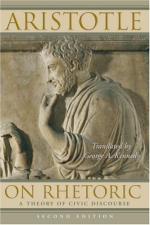
|
| Name: _________________________ | Period: ___________________ |
This quiz consists of 5 multiple choice and 5 short answer questions through Book I, Chapters 4-9.
Multiple Choice Questions
1. Which one of the following assessments did Aristotle use to support his analysis in Book I, Chapter 7?
(a) Some things are better than others.
(b) Some things are similar to others.
(c) Some things are not better than others.
(d) Some things are different than others.
2. According to Aristotle, how could a person defend their position in the future when they discovered the truth of a question?
(a) More forcefully.
(b) More precisely.
(c) Less precisely.
(d) Less forcefully.
3. How did Aristotle think a political orator should convince an audience of their plan?
(a) By showing that it was better than all other options.
(b) By showing that it was just as good as most other options.
(c) By showing that it was better than most other options.
(d) By showing that it was just as good as all other options.
4. According to Aristotle in Book I, Chapter 1, what was not a concern of rhetoric?
(a) A specific subject.
(b) An academic subject.
(c) A vague subject.
(d) A hypothetical subject.
5. Which tactic was not included as something that an epideictic rhetorician might use?
(a) Exaggeration.
(b) Amplification.
(c) Comparison.
(d) Competition.
Short Answer Questions
1. Besides goodness itself, what else did Aristotle indicate a political orator must deal with?
2. How did Aristotle think the political orator should be able to speak about the good?
3. What was the difference between rhetoric and dialectic in the logical appeal?
4. In comparison to the other appeals, how much did Aristotle think that rhetoric resembled the dialectic in the logical appeal?
5. How many forms did Aristotle think the emotional appeal could take?
|
This section contains 323 words (approx. 2 pages at 300 words per page) |

|




